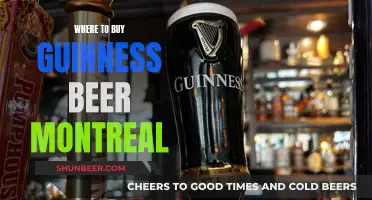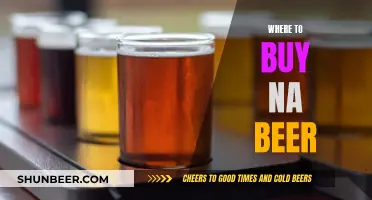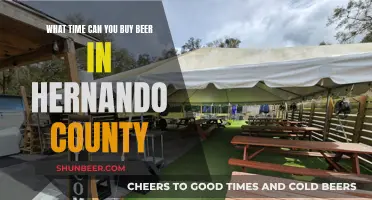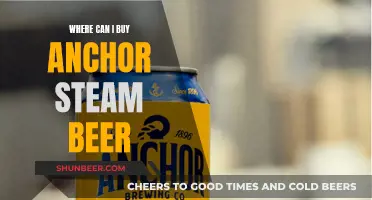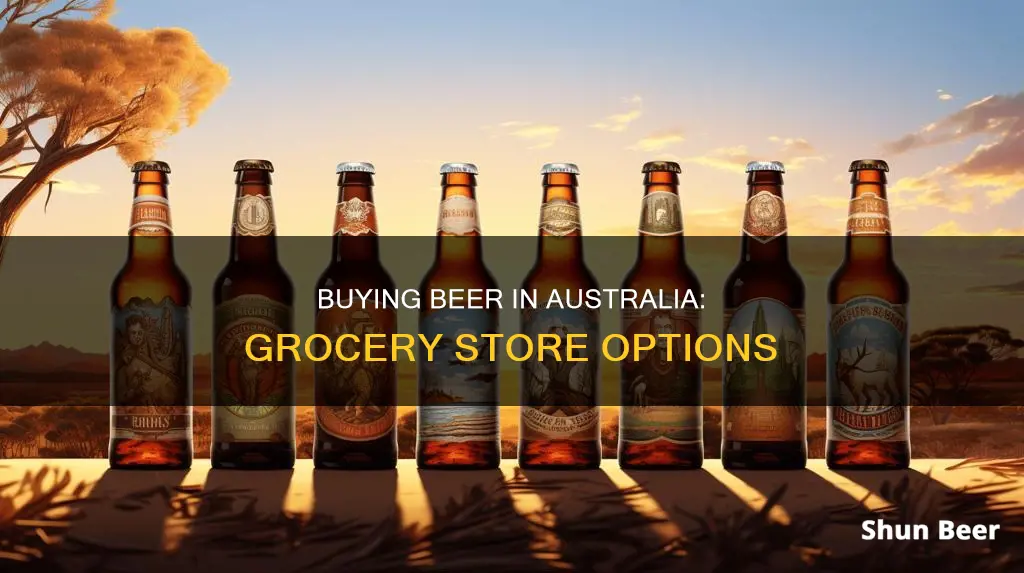
In Australia, the sale of alcohol in grocery stores is subject to varying regulations across states. In Queensland, for instance, supermarkets are not licensed to sell alcohol, while in New South Wales and Victoria, supermarkets are permitted to sell liquor within their premises. This discrepancy in regulations has sparked debates among lawmakers, retailers, and public health advocates, with some advocating for a relaxation of restrictions and others expressing concerns about the potential impact on public health.
| Characteristics | Values |
|---|---|
| Alcohol sales in grocery stores | Varies by state. In Queensland, supermarkets are not licensed to sell alcohol. In New South Wales and Victoria, supermarkets are allowed to sell liquor within the store. |
| Reasons for restrictions | Public health and safety concerns, historical "conservatism" in lawmaking, and the influence of large retailers that prefer to sell alcohol through dedicated outlets. |
| Potential changes | The government has considered proposals to relax restrictions, but the final decision lies with individual states, many of which aim to act tough on liquor. |
What You'll Learn

In Queensland, only retailers with a pub license can sell beer in a bottle shop
Instead, Queensland laws permit alcohol to be sold in separate retail shops known as detached bottle shops (DBS). These can be operated by licensees who hold a Commercial Hotel License for separate premises, typically within a 10km radius of the main Commercial Hotel premises. However, there are exceptions to this rule, such as when a licensee intends to operate a DBS in a remote area without other takeaway alcohol stores.
The unique aspect of Queensland's DBS system is that it allows for the sale of alcohol in shops physically detached from the main licensed premises, such as a tavern or hotel. This is a result of additional requirements set out in Part 4, Division 2 of the Liquor Act 1992. These requirements include the need for licensed premises to have a seating capacity of over 60 patrons, male and female toilet facilities, a commercial kitchen, and at least two of the following: a dining facility, self-contained accommodation for paying guests, or a function room available for hire.
While this presents challenges for big box retailers, who typically do not include these features, they can overcome this by operating from premises immediately adjacent to a tavern or hotel. This way, the "licensed premises" for the Commercial Hotel License can include both the big box store and the adjacent tavern.
It is important to note that the sale of alcohol in Queensland is regulated by the Office of Liquor and Gaming Regulation (OLGR) under the Liquor Act 1992 and the Wine Industry Act 1994. These laws govern the licensing requirements and conditions for retailers looking to sell alcohol in the state.
Non-Alcoholic Beer: Age Limit for Purchase and Consumption
You may want to see also

Coles and Woolworths own most of the bottle shops
While it is not possible to buy beer or other alcoholic drinks in Australian grocery stores, the major supermarket chains Coles and Woolworths own most of the bottle shops. Woolworths has the highest market penetration among alcohol retailers, with 60.7% of Australian alcohol buyers purchasing from its stores in an average four-week period. This includes brands such as Dan Murphy's, BWS, Cellarmasters, and Woolworths Liquor. Meanwhile, Coles Group, including First Choice Liquor, Liquorland, and Vintage Cellars, has a penetration of 22.5%.
Woolworths' dominance in the alcohol retail sector is further demonstrated by its capture of more than half of the packaged liquor market. The company's success is largely attributed to the popularity of its Dan Murphy's division, which accounts for around a third of total alcohol sales nationwide.
The supermarkets' buying power has driven down prices for consumers, but their sustained below-cost pricing has also negatively impacted smaller, independent retailers, making it difficult for them to compete. This has led to concerns about the potential for reduced competition in the industry and the possible negative consequences for consumers if the major players were to recoup lost revenue through higher prices.
The Australian Competition and Consumer Commission (ACCC) has previously taken legal action against both Coles and Woolworths for anti-competitive liquor deals, fining them $4.75 million and $7 million, respectively. Despite this, their combined market share in the liquor industry continues to grow, with their dominance extending beyond the grocery market.
Buying Beer on Sundays in Arizona: What's the Deal?
You may want to see also

In the ACT, you can buy beer in supermarkets
In the Australian Capital Territory, you can buy beer in supermarkets. This is due to liquor licensing laws in the ACT, which allow for the sale of alcohol in supermarkets. This is in contrast to other states in Australia, such as Queensland, where supermarkets are not licensed to sell alcohol.
In the ACT, the server of alcohol must be over 18 and have an RSA (Responsible Service of Alcohol) certificate. This is to ensure that alcohol is sold responsibly and to prevent underage drinking.
The ability to purchase beer in supermarkets in the ACT provides convenience for customers, as they can buy their groceries and alcohol in one location. It also offers a wider selection of beer brands and types compared to specialised bottle shops.
However, it's important to note that the laws regarding alcohol sales in Australia can vary from state to state. While the ACT permits alcohol sales in supermarkets, other states may have different regulations in place. For example, in New South Wales, alcohol can be sold within the store, but it must be in a separately defined area if the primary business activity of the premises is not alcohol sales.
The discussion around allowing alcohol sales in supermarkets in Australia is ongoing, with some public health advocates expressing concern over the potential impact on alcohol-related harm. On the other hand, supporters of changing the laws argue that it would provide convenience and increase competition in the market. Ultimately, the decision to amend liquor laws lies with the state governments, and there may be variations in the regulations across different states.
Buying Beer on Thanksgiving in Connecticut: What's the Deal?
You may want to see also

In NSW, bottle shops must close at 10 pm
In Australia, alcohol cannot be purchased in most supermarkets and must be bought from a bottle shop or liquor store. However, some Aldi stores sell liquor in dedicated zones within the main part of the store, allowing customers to buy beer and groceries in a single transaction.
In New South Wales (NSW), bottle shops were previously required to close at 10 pm. This was extended to 11 pm in December 2016, with the exception of Sundays, when bottle shops must still close at 10 pm. The NSW Government's decision to extend bottle shop opening hours was informed by a review of liquor regulation, which recommended extending closing times during the busy summer holiday period.
The Australian alcohol industry has criticised the use of precinct-wide lockouts and state-wide mandated closing times for bottle shops, arguing that these measures punish responsible drinkers and well-run businesses. Instead, the industry has advocated for alternative approaches to tackling anti-social behaviour and violence, such as stronger penalties for violent offenders, improving nighttime transportation, and increasing police presence.
Public health advocates have expressed concern over the extension of bottle shop opening hours in NSW, warning that greater access to takeaway alcohol could lead to increased rates of domestic violence and alcohol-related harm. They have pointed to the positive impact of previous restrictions on reducing alcohol-related harm and violence.
Buying Beer at South Carolina Gas Stations: What's Allowed?
You may want to see also

In New Zealand, 24-hour supermarkets can sell alcohol until 10 pm
In Australia, it is not possible to buy beer at the grocery store. This is due to liquor licensing laws, which vary across the country. For example, in New South Wales, the Liquor Act insists that alcohol be sold in a separate area from the rest of the groceries. In the Australian Capital Territory, however, alcohol can be purchased in supermarkets.
In New Zealand, the situation is different. 24-hour supermarkets can sell alcohol until 10 pm. This is because, in 1999, supermarkets and some smaller grocers were granted permission to extend their liquor licenses to sell beer and wine. This change in legislation also allowed alcohol to be sold on Sundays for the first time in nearly 120 years.
The ability to sell alcohol 24 hours a day, seven days a week, is something that some New Zealand supermarkets have been pushing for. In 2001, Foodtown supermarkets in Green Lane and Grey Lynn applied to the Liquor Licensing Authority for permission to sell alcohol round the clock. Under their current licenses, they must stop selling alcohol at midnight during the week and at 10 pm on Sundays. The frustration for these supermarkets is that customers who enter the store before closing time but don't reach the checkout until after are unable to purchase alcohol.
In 2024, a proposal was put forward by the Australian government to allow supermarkets to sell alcohol in the aisles. This would bring Australia in line with the UK and Europe, where alcohol can be purchased in supermarkets. However, public health advocates reacted with horror at the proposal, and it was not implemented.
Stroh's Beer: Where to Buy and Its History
You may want to see also
Frequently asked questions
No, in most states in Australia, you cannot buy beer at the grocery store. However, in New South Wales and Victoria, supermarkets are allowed to sell liquor within the store, so you can buy beer at certain supermarkets in those states.
The tradition of restricting how alcohol can be sold in Australia dates back to the 19th century when temperance advocates were reluctant for alcohol to be sold alongside other goods. Today, public health advocates continue to argue that alcohol should be kept separate from other groceries.
In Australia, you can buy beer at dedicated bottle shops or "bottle-os", which are often owned by the same companies that run the major supermarkets. Some supermarkets have bottle shops attached to them, while others have dedicated liquor sections within the main part of the store.
Maybe. In 2015, the Australian government considered a proposal to relax the laws restricting where and how supermarkets can sell liquor. However, as of 2024, you still cannot buy beer at most grocery stores in Australia.



